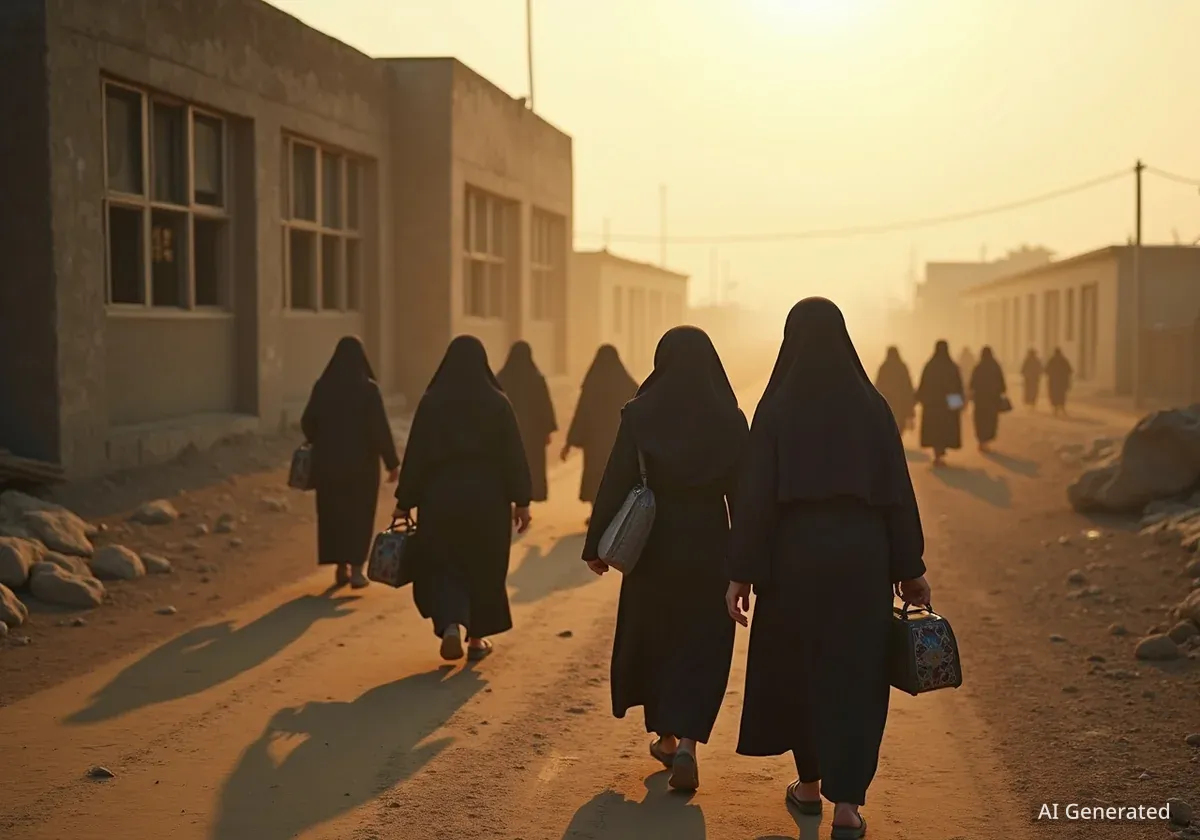September 17, 2025, marks a somber anniversary: four years since the de facto authorities in Afghanistan banned girls from attending secondary school. This policy has kept over 2.2 million adolescent girls out of classrooms, part of a broader rollback of women's rights since the Taliban regained control of the country.
The ban persists despite widespread domestic and international condemnation. For millions of young women, the closure of schools has meant the end of their ambitions and a future confined to the home. The United Nations and human rights advocates continue to call for the immediate reversal of this decision, highlighting the long-term damage to both the girls and the nation's future.
Key Takeaways
- It has been four full years since girls were banned from secondary education in Afghanistan.
- Over 2.2 million girls are directly affected by the high school ban, with a total of up to seven million children out of school.
- Activist Fatima Amiri, a survivor of a school bombing, is a prominent voice advocating for the restoration of educational rights.
- Despite the ban, many girls are pursuing education through secret schools and online resources, showing remarkable resilience.
- International bodies are urging for practical support, such as online learning opportunities and scholarships, for Afghan girls.
A Generation's Dreams on Hold
The decision to close secondary schools to girls was implemented shortly after the Taliban took control in 2021 and has become one of the most visible symbols of their policies regarding women. This prohibition has effectively halted the educational journey for an entire generation of young women, preventing them from acquiring the knowledge and skills necessary for personal development and professional careers.
The impact extends beyond the individual. Experts warn that excluding half the population from education will have devastating consequences for Afghanistan's economy, healthcare system, and social fabric. A country already facing immense challenges, including a recent major earthquake, is further hampered by policies that restrict the potential of its citizens.
Widespread Support for Girls' Education
According to data from UN Women, the ban on girls' education is deeply unpopular within Afghanistan itself. More than 90% of the country's population supports girls attending secondary school, indicating a significant disconnect between the authorities' policies and public sentiment.
The Voice of a Survivor
Fatima Amiri has become a powerful advocate for the millions of girls silenced by the ban. Her story is one of immense tragedy and unwavering determination. In 2022, while studying for her university entrance exams in Kabul, a suicide bomber attacked her classroom. The blast killed more than 50 of her classmates and left her with severe injuries, including the loss of an eye and hearing in one ear.
Despite this traumatic experience, Fatima's commitment to education never wavered. She took her university entrance exam from her hospital bed and achieved a high score. However, her dream of studying computer science was cut short when the authorities extended the education ban to include universities for women.
"I'm just an example of many girls and women in Afghanistan who have been denied justice. The only thing that I can is their voice, to speak with the world and to transfer their message to other people so that they can help them."
Now living outside Afghanistan, Amiri uses her platform to speak at international forums, including the UN Human Rights Council in Geneva. She shares messages she receives daily from girls back home who feel hopeless and trapped. "They are in a very bad situation… the only thing they had was education, but right now they do not have it," she explained.
A Call for Action Beyond Words
During her address to the UN Human Rights Council, Amiri stressed that condemnation alone is not enough. After four years of closed schools, she argued that the international community must move from rhetoric to concrete action. "It has been four years!" she stated. "Speaking is not enough; we speak a lot, it's time to do something, we need actions."
Practical Solutions Proposed
Amiri and other advocates are calling on world governments and organizations to provide tangible support for Afghan girls. They suggest several pathways to help girls continue learning despite the official restrictions:
- Scholarships: Offering opportunities for Afghan girls to study abroad at universities and colleges.
- Online Learning: Funding and creating robust online educational platforms that can be accessed securely from within Afghanistan.
- Resource Support: Providing digital devices and internet access to girls who lack the means to connect to online courses.
The Broader Context of Restrictions
The education ban is part of a wider system of restrictions imposed on women and girls in Afghanistan. These include prohibitions on women working for most non-governmental organizations (NGOs), including as aid workers, which complicates disaster relief efforts. Women are also barred from many public spaces, including parks and gyms, and must adhere to a strict dress code. These measures have effectively erased women from public life.
Unstoppable Thirst for Knowledge
Despite the immense obstacles, the desire for education among Afghan girls remains strong. Many have found ways to continue their studies through informal and often risky channels. Secret schools have emerged in private homes, and online learning groups connect students with teachers both inside and outside the country.
Amiri, who teaches English to some of these girls online, described their motivation as inspiring. "Girls in Afghanistan are unstoppable," she said. "They're trying more and more every day. It's true that they do not have the right to study and that the internet connection is not good, but they are still trying to study, to learn something new."
These clandestine efforts highlight the value that girls and their families place on education. Books are treated like "precious treasures," and knowledge is shared through whispers and hidden networks. This resilience demonstrates a powerful defiance against the oppressive policies, but it is not a sustainable substitute for a formal, functioning education system.
As the four-year mark passes, the international community faces renewed pressure to find effective ways to support these girls. The future of an entire generation, and of Afghanistan itself, hangs in the balance, dependent on whether their fundamental right to education can be restored.





